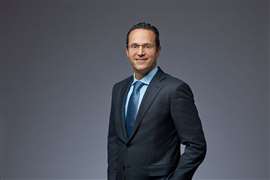Shell CEO: LNG part of company’s ‘advantage’
November 04, 2024
Company beats forecast by 12%
During Shell’s earnings call with analysts, CEO Wael Sawan shared his insights on the crucial role of LNG in the global energy transition. With a focus on geopolitical dynamics, market volatility, and technological advancements, Sawan outlined a multi-decadal journey where oil and gas will remain integral to the energy mix.
The company reported reported third-quarter profits of $6 billion that exceeded forecasts by 12% as LNG sales offset a sharp drop in oil refining and trading results.
Sawan began by emphasizing that the energy transition is not a swift process but a complex, multi-decade journey. He acknowledged that multiple energy forms will be required to navigate this transition effectively. “The energy system will increasingly face uncertainty and volatility due to geopolitical changes and supply-demand cycles,” he explained. This perspective reflects the company’s strategic positioning in the market.
 Wael Sawan
Wael Sawan
Central to Sawan’s vision is the belief that oil and gas, particularly natural gas, will play a critical role for many years to come. “Gas is a foundational part of the future energy complex,” he stated, underscoring its significance in a low-carbon future. As the world shifts towards renewable energy, the reliability and versatility of LNG can help bridge the gap, especially given the intermittency of renewables.
One of the company’s competitive advantages lies in its robust LNG capabilities. Recent announcements highlight their commitment to expanding LNG production and trading. Sawan noted, “We want to continue honing our LNG advantage over the coming years.” Recent acquisitions, such as the Pavilion deal that adds 6.5 million tons of LNG capacity, exemplify this strategy.
The CEO highlighted ongoing projects, including LNG Canada and initiatives in Qatar and Nigeria, to bolster their LNG footprint. These developments align with increasing global demand for LNG, particularly from markets in China and India, which have shown a significant uptick in purchasing.
Sawan addressed the current state of the LNG market, noting that it has been characterized by uncertainty and volatility. “The prompt markets are looking tighter than some had envisioned,” he remarked. This tightening is partly attributed to delays in major LNG projects in the United States. Additionally, Sawan pointed out emerging LNG buyers, including Brazil and Egypt, which reflect a shifting landscape in global energy demand.
Despite these fluctuations, Sawan expressed confidence in the company’s strategic position. “Where we can create value is by having options in a cyclical market,” he said. As a significant player in both purchasing and selling LNG, the company aims to navigate market cycles adeptly.
Looking ahead to 2025, Sawan acknowledged the challenges of predicting market dynamics amid geopolitical tensions. “The market continues to show balance at least for the next year,” he noted, but emphasized the unpredictable nature of demand, particularly in Europe where industrial needs have softened.
Sawan also discussed the implications of recent contracts, including one with Turkey’s BOTAS. While there have been reports of declining term pricing, he refrained from disclosing specific figures, stating, “We don’t worry about what we can’t control, which is where the market fundamentals are.” Instead, the company focuses on its strategic responses to shifting conditions.
On the operational front, Sawan provided updates on key projects. The completion of LNG Canada Phase 1 is nearing, with expectations for first cargoes by mid-next year. As for Phase 2, the decision rests with the joint venture partners, who must present a viable investment opportunity. “We are pleased with our current acreage, which gives us flexibility in production,” he mentioned.
Sawan’s vision includes not only enhancing LNG production but also investing in innovative energy solutions. He highlighted the company’s investments in low-carbon technologies and biogas, indicating a commitment to integrating these solutions into their broader energy strategy. “We need to ensure that our energy transition is planted on solid foundations,” he stated.
Sawan also argued against the notion that capital investment should solely signify a commitment to energy transition. Instead, he highlighted the importance of demonstrating consistent returns before further investments are made. “We have invested significantly in nature energy and need to prove value before considering additional investments,” he explained.
MAGAZINE
NEWSLETTER
CONNECT WITH THE TEAM






